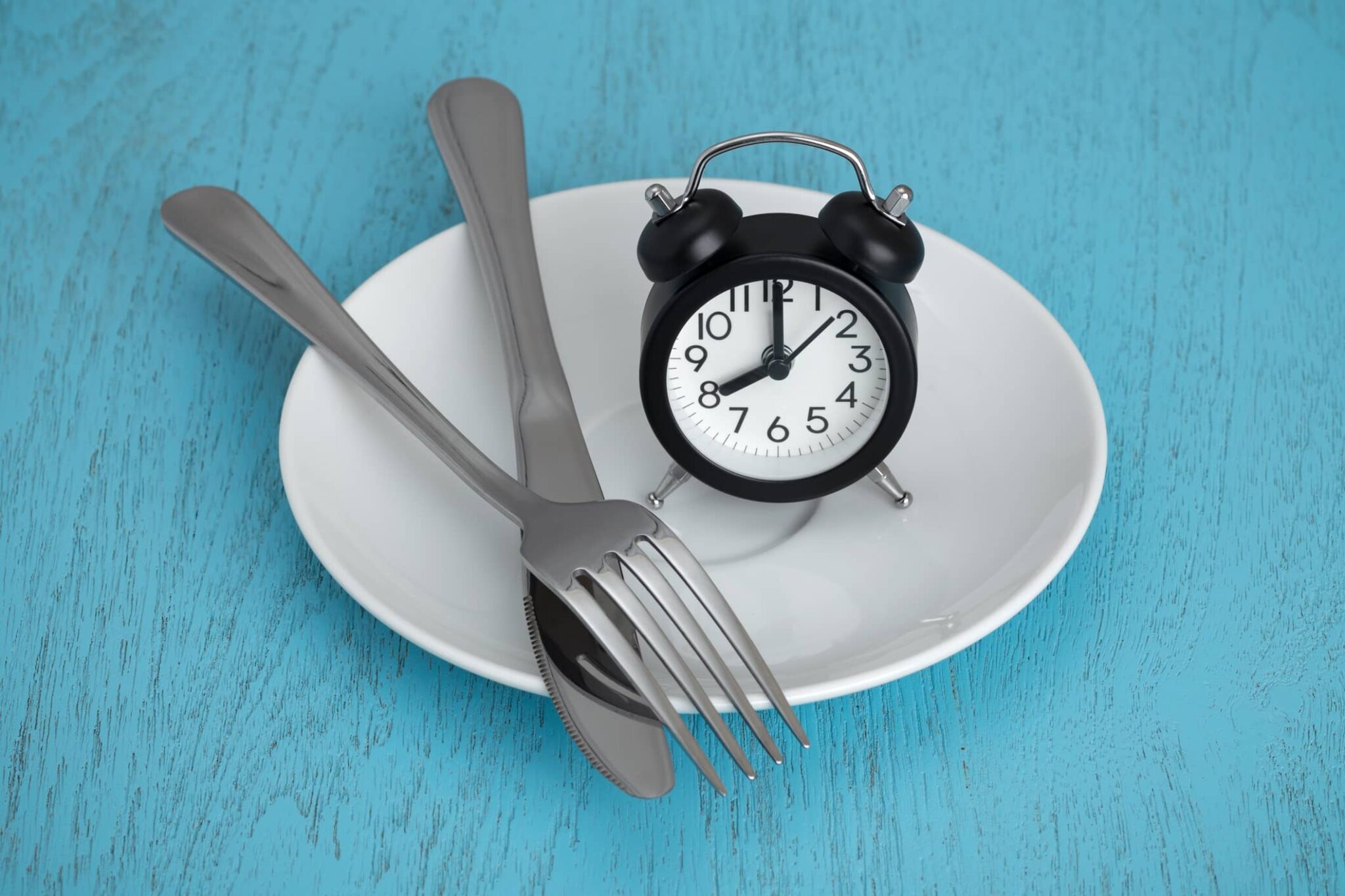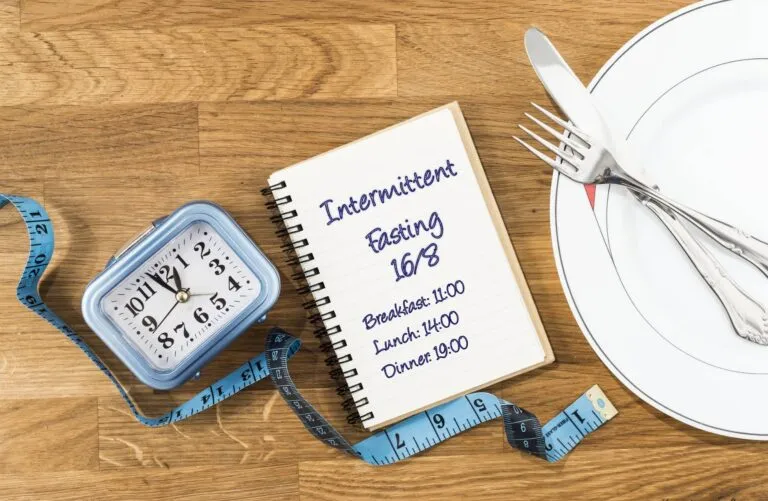
Intermittent Fasting (IF) has hit the headlines in recent years, touted by many to be a superior way to lose body fat (and build muscle). Many Bodyscan customers tell us at their first DEXA scan appointment that they are giving it a try.
In this article we’ll discuss just how superior intermittent fasting is, and whether you stand to benefit from trying it out. We’ll also share a personal story from Bodyscan director, Philip Chant, who practised IF some years ago.
What is an Intermittent Fasting diet?
There are many variants of intermittent fasting, but all of them involve periods of eating followed by extended periods of fasting. Depending on the intermittent fasting protocol, that fasting period may be true fasting (ie, zero calorie intake) or may permit the consumption of a very small number of calories.
We’ll look at those variants in a moment.
Intermittent Fasting for Weight Loss
The main reason people embark on a fasting diet is to lose weight or, more precisely, lose body fat. With that in mind, let’s remind ourselves of the fundamental principle of fat loss: for fat loss to occur, energy intake must be less than energy expenditure (or ‘calories in’ must be less than ‘calories out’).
[Before (or as soon as possible after) you embark on an intermittent fasting or any other diet plan, you would do very well to establish a precise picture of your body composition (how much fat and muscle you have) against which you can track progress. The best way to do this is with a DEXA body scan. Bodyscan’s DEXA consultant will also give you a target specifically for fat loss, rather than weight loss.]
When it comes to ‘calories in’ versus ‘calories out’, it doesn’t matter if you eat a set number of calories in the space of 8, 10 or 16 hours, or across five or seven days of the week. If two diets are iso-caloric (ie, have the same number of calories), then both will create the same degree of fat loss.
So does that consign intermittent fasting diets to the fat-loss bin?
No, because when it comes to fat-loss (and muscle gain), consistency is key. The best diet or exercise regime is the one you stick to. And that’s where intermittent fasting may help you succeed where other means of restricting your calories have failed. (At your Baseline DEXA appointment we can discuss tools and tips to help you on your journey.)

Intermittent fasting may better fit your busy lifestyle
The different variants of intermittent fasting give you the flexibility to select an eating pattern that suits you and your schedule, so it may help you keep to your reduced calorie target.
Why? Because when your calorie target is spread across the day, the meals are smaller and less satisfying, making it more likely you will over-eat. Intermittent fasting allows meals to be larger and consumed within a shorter timeframe, thus increasing your perceived level of ‘fullness’. If you feel full, you are less likely to eat more (providing you listen to your hunger signals!)
So if you are someone who has a big appetite, intermittent fasting could benefit you as the meals can be larger.
On the other hand, an intermittent fasting diet will not work if it encourages you to over-compensate for the skipped meals and consume more total calories when the fasting period ends. Look at Point (6) in this article to see how easily an ‘over-eat’ surplus can completely wipe out a previous deficit.
Remember that every fat-loss diet works by restricting the total number of calories you consume over a sustained period. Intermittent fasting diets are no exception. By limiting the periods when you can eat to a few hours a day or only some days of the week, the idea is that a fasting diet will force you to consume fewer calories.
But we are all different. If you are someone who can last extended periods without food, or someone who has yet to try an intermittent fasting protocol, it may be something worth considering. But if you can stick to a calorie deficit regardless of satiety levels (feeling hungry), then IF will not provide any additional benefit.
GET OUR FREE FAT-LOSS GUIDEWhat is the best Intermittent Fasting schedule?
As we said above there are many variants of intermittent fasting, whose differences are in the duration of eating and fasting periods, the times of day (or days of the week) when eating/fasting occur, and whether the fasting periods are no-calorie or low-calorie.
Popular variants of intermittent fasting are:
- Time-restricted eating (TRE), including 16:8 and the Warrior Diet (20:4)
- The 5:2 Diet
- Alternate Day Fasting (ADF)
- 24-hour fasting (Eat Stop Eat)
As we’ve established above, fat-loss is dependent on maintaining a calorie deficit over time, so no particular schedule is superior in that regard. Where one schedule will trump another is simply in your ability to stick to it.
The 16:8 is probably the most popular intermittent fasting schedule, with eating often confined to starting around lunch time – say, between 1pm-9pm (known as mTRE, or midday time-restricted eating). If you don’t eat breakfast then you are practising intermittent fasting already, fasting from dinner time to the next day’s lunch time.
Some claim that early time-restricted eating (eTRE) provides benefits because it aligns with our circadian rhythm in energy metabolism, but research is thin on the ground.
Whether you eat no-calorie or low-calorie in the fasting period is up to you. Remember, over time, you simply have to be in a calorie deficit, so experiment and see which, if any, intermittent fasting protocol you can stick to and which delivers a good result.

Intermittent Fasting – a Personal Anecdote
Philip Chant, Bodyscan Director: I got great results from intermittent fasting about 15 years ago, eliminating my skinny-fat pot belly in less than three months.
The fasting protocol/schedule I used was 24-hour fasting, twice a week. It didn’t involve no eating at all on any one day (the fasting period is 24 hours, stretching across two calendar days, so I might have breakfast and lunch on one day, fast for 24 hours and resume eating with lunch the following day) and I found it much easier to eat nothing (water, green tea permitted) rather than eat a little, which only served to trigger my appetite and make me want to eat more.
I found that lunch-to-lunch or dinner-to-dinner worked best for me, based on my work schedule at the time. I didn’t plan the days I would fast, I usually decided to fast until dinner time (from the previous night’s dinner) after waking and deciding I wasn’t hungry.
Another tip for the 24-hour flavour of intermittent fasting is to tell yourself out loud when you will next eat, so your brain is not expecting food at your traditional mealtimes. Like waking early for a flight without an alarm, I found it to be a case of mind over matter!
Also, I had previously signed up with a personal trainer who, in passing, said he had heard of “a new way to measure body fat: a DEXA scan, or something.” The scans showed me the PT’s programme was not working and, after I ditched him, that my intermittent fasting diet was!
How can you tell if Intermittent Fasting is working?
We said at the start that the main reason people start intermittent fasting is to lose body fat, which is different from losing weight because weight could mean losing muscle, which is not a good outcome.
Therefore, the best way to validate an intermittent fasting (or any) diet is to measure changes not in weight, but in body composition (fat and lean mass). The most consistent way to do this is with a DEXA scan, a medical-grade diagnostic imaging technique, which uses a very low dose of dual-energy X-rays.
A DEXA scan will give you a much better estimate of your calorie requirements than the usual calorie calculators because they establish your lean body mass, which is the biggest burner of calories, in the shape of muscles and organs.
Some intermittent fasting protocols don’t specify calorie intake, they tend to advise you to just “eat normally” after the fasting period, though the Warrior Diet (20:4) says you can “overeat” and the 5:2 Diet dictates a maximum of 800 calories in the eating periods. Regardless, it is useful to have a good estimate of your maintenance calories and a DEXA scan is useful in this regard (as well as many others, such as internal fat, fat and muscle distribution, bone density and more. Read this to see what a DEXA scan tells you.)
Intermittent Fasting for Muscle Gain
Is intermittent fasting superior for muscle gain? Not necessarily. Whereas fat-loss is all about the calories, muscle growth depends on how good your resistance programme is and by progressively overloading in the gym. In layman’s terms, this means seeing a gradual increase in the weights lifted, or an increase in the number of sets or reps (with a given weight) in the gym over time.
You should therefore eat in a way that optimises performance. Perhaps that means eating small meals frequently throughout the day. Perhaps it means training fasted. Everyone is different. The effect that eating windows have on performance is highly individualised, so there is no one-size-fits-all formula. Section 1 of our free muscle-building guide discusses the factors you can’t change that can adversely affect your efforts (eg, age, sex and hormone levels).
A 16-hour fast and an 8-hour eating window may benefit some people’s training, whilst for others it may be detrimental. The best way to establish what works for you is to try out various approaches.
GET OUR FREE MUSCLE GUIDEIntermittent Fasting: Benefits other than body composition
Many proponents of intermittent fasting diets claim advantages beyond fat loss and muscle gain, chiefly cognitive improvements. But a 2021 review of the sparse amount of available studies suggests that intermittent fasting does not lead to any short-term cognitive benefits in healthy people, but may protect against the development of neurological disorders.
Summary: Is Intermittent Fasting superior to other diets?
To sum up, eating in a specific time window is not superior for losing body fat compared to an unrestricted eating window providing the same number of total calories is consumed. And time-restricted eating has little to do with muscle gain. You should eat in a way that optimises performance (remember, it’s the effectiveness of your resistance regimen that’s critical), which is dependent on the individual – that’s you!
Your first DEXA scan with Bodyscan will discuss your unique objectives and give you a detailed and plain-English interpretation of your results. This will leave you inspired, motivated and well-equipped to achieve your goal, whichever approach you take. Certainly, an intermittent fasting diet works for many people and is worth a try if you’ve never tried it before.
We have two scanning clinics in London – Marylebone and the City. Both are easy to get to by public transport, so book your Baseline DEXA scan now. If you have any questions, drop us an email or search our FAQs.
Philip Chant
BodyScan Director